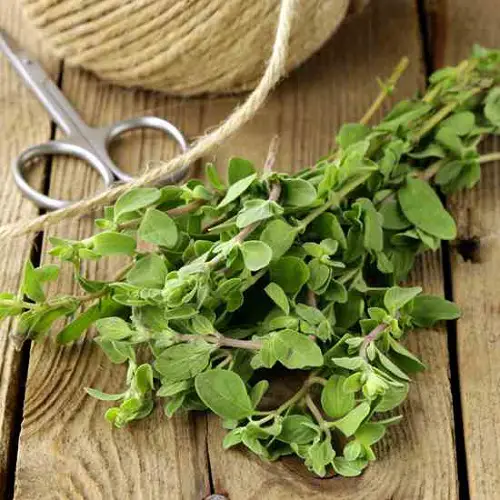There are many Herbs You Can Grow from Fresh Softwood Cuttings to have an endless supply in the kitchen quickly. We’ve picked the eleven best!
Growing herbs from softwood cuttings is the best way to never let the supply of fresh organic sprigs come to a halt. You can grow them easily from new growth without waiting for the old hardwood growth to appear!
What are Softwood Cuttings?
In simple terms, softwood cutting propagation is a way to grow a plant by taking a soft, recent, flexible growth of the stem and planting it. The cutting is taken when the plant is actively growing, especially in spring and summer.
Hardwood cuttings, on the other hand, are older, past year branches–woody, stiff, and taken from plants that are not growing actively in late fall, winter or early spring. They’re more mature and take longer to root, needing a whole season to develop roots and leaves. So, softwood cuttings are the quicker and easier option for multiplying your favorite herbs.
Now that you know the differences discover what herbs grow that way:
Propagating Herbs from Cuttings
To take a softwood cutting, find a healthy, non-flowering stem with 4-6 inches of new growth. Use sharp scissors to snip right below a leaf node (bump where a leaf meets the stem). Then, remove the lower leaves to expose the stem for rooting.
To propagate, 1. Dip the cut end in the rooting hormone (You can use honey for this). 2. 3. Plant in a pot with moist potting mix, leaving some stems above the soil. 4. Make sure at least one leaf node is inserted and covered in the soil. 5. Water gently and keep the pot in a warm, humid place with indirect light.
That’s it. Now, you have to be patient. Different herbs take different durations to form roots, but usually, you’ll notice new roots and shoots growing in about 2-6 weeks.
Herbs You Can Grow From Fresh Softwood Cuttings
1. Rosemary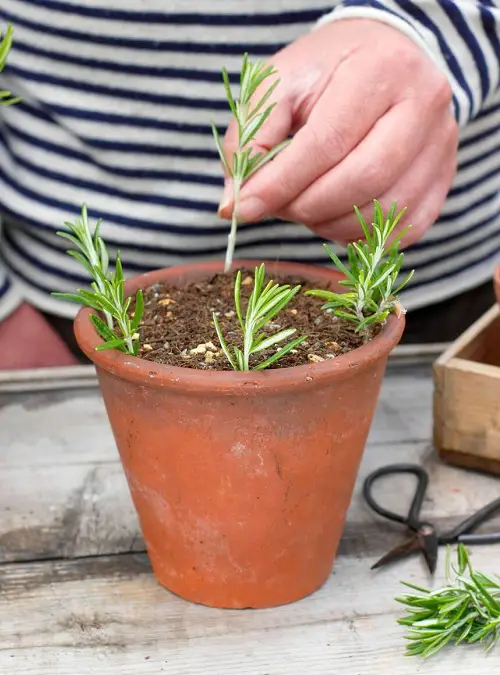
Botanical Name: Rosmarinus officinalis
One of the most flavorful herbs, Rosemary is best propagated from fresh softwood cuttings in spring or summer in a cold climate (USDA Zones 3 to 8) and year round in hot climates (USDA Zones 9 to 11), except for peak summer. You can identify a mature plant by its green, needle-shaped leaves that grow on woody stems.
2. Thyme
Botanical Name: Thymus vulgaris
To obtain new healthy Thyme plants, take stem cuttings from the mother plant in late spring or early summer; you can also do this in early to mid fall. Instead of planting just one or two cuttings, plant as many as possible to increase your success rate.
3. Sage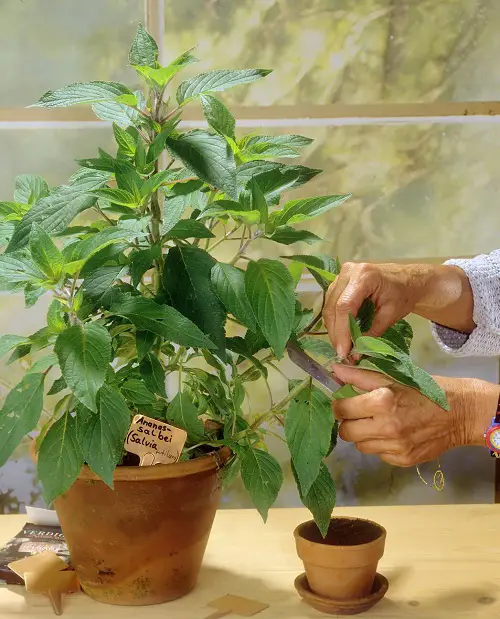
Botanical Name: Salvia Officinalis
When taking sage cuttings for propagation, look for soft, non-woody stems and pick 4 to 6 inches of growth. Don’t forget to dip them in a rooting hormone. To have multiple plants, do this twice—one batch in May and another in June or July. In a frost-free region, you can even start them earlier in February or March.
4. Oregano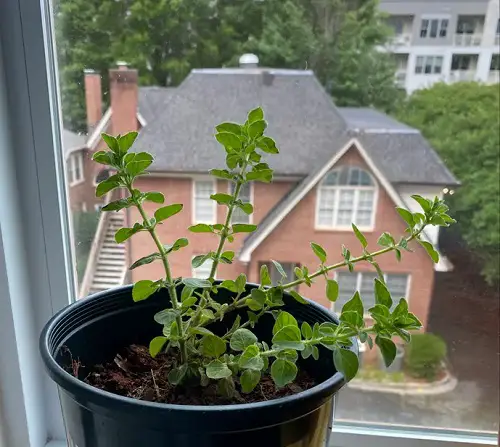
Botanical Name: Origanum vulgare
Every pizza is incomplete without a bit of this, so if you want to ensure you never run out of fresh Oregano sprigs the next time, propagate it through fresh softwood cuttings in late spring or early summer.
Also, maintain good humidity by covering the cuttings with a plastic bag for a mini greenhouse like advantage. Here’s how to grow it.
5. Marjoram
Botanical Name: Origanum majorana
The best time to take the fresh softwood cuttings of this Oregano cousin is when the sun is at its full blast, around early and mid-summer. If you live in a hot climate, do this before summer.
The viability of the cuttings is short-lived, so you must act quickly. Take 4-5 cuttings and stick them in one pot to grow more of this herb. Marjoram also grows best from layering, so consider that as an option for propagation as well.
6. Lavender
Botanical Name: Lavandula angustifolia
Could we afford to miss Lavender, the only herb here with the most beautiful flowers and usefulness? It is the best one to grow from softwood cuttings and easier as well if you water your lavender plant deeply a day before taking cuttings and allow the cut ends to callus for a few hours before planting.
7. Lemon Balm
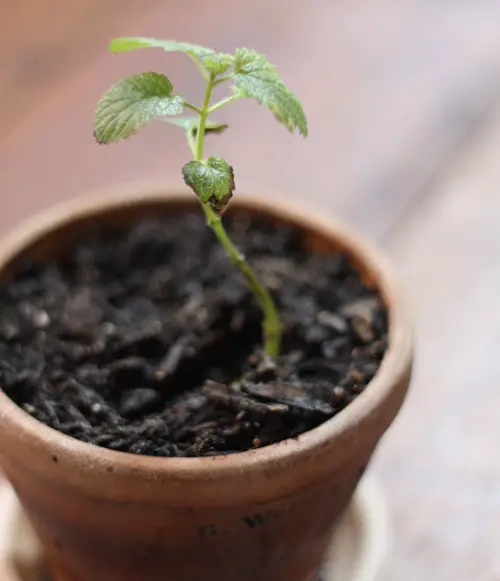
Botanical Name: Melissa officinalis
As the name suggests, if you take a whiff of the Lemon Balm, it’ll remind you of the lemon fruit. The lemon-like flavor profile makes it perfect for citrusy teas and dishes, so if you, too, are craving a kick of such a flavor, you can easily grow this herb yourself through fresh softwood cuttings.
8. Mint
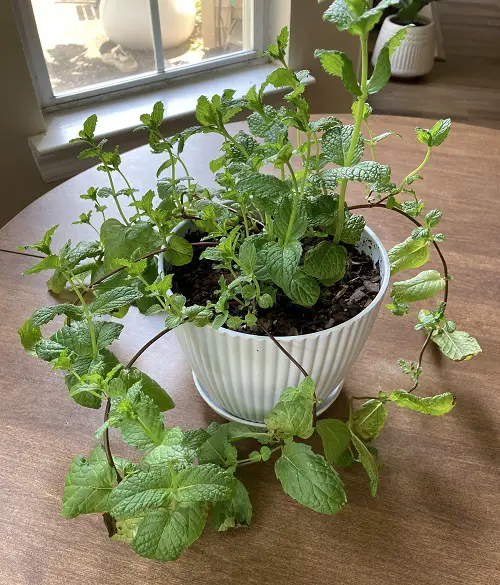
Botanical Name: Mentha
Mint is known for its cooling properties and fresh taste, making it a savior during hot summer days. If you agree and want to multiply this delightful herb, try spotting a healthy mature plant with the signature sharply serrated leaves.
Take multiple soft cuttings that are pliable and have at least one leaf node and plant in a well-draining soil mix. The best part is that you can also grow it in water. Here’s a trick you should not miss to grow unlimited mint.
9. Basil
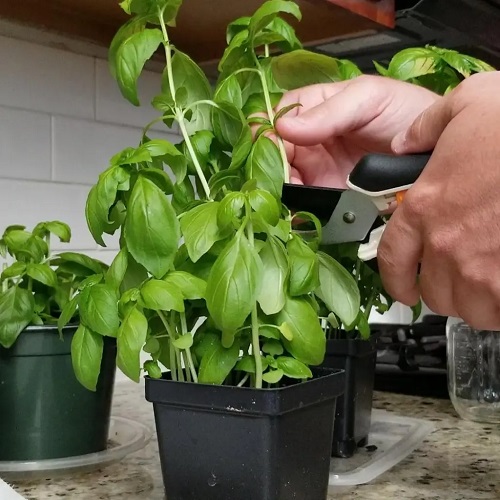 Botanical Name: Ocimum basilicum
Botanical Name: Ocimum basilicum
Aptly titled the King of Herbs, Basil is most used in Mediterranean cuisines and the easiest herb you can propagate from young softwood cuttings harvested in the warmer months of the year. No matter what variety, you can propagate it anytime in the year except when it’s not too cold (late fall and winter) and too hot (peak summer in warm climates).
10. Lemon Verbena
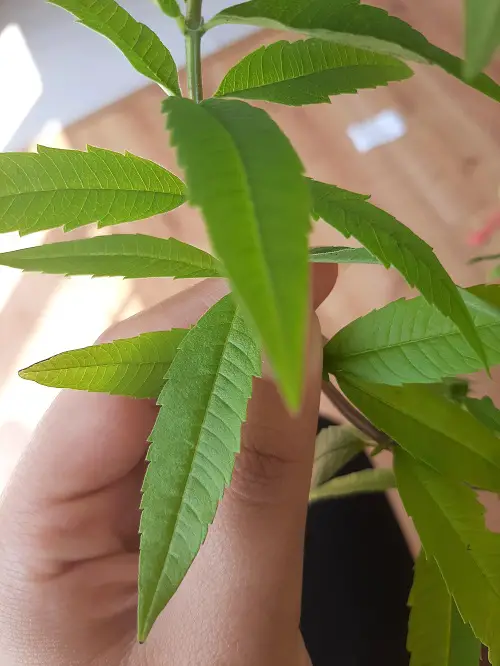
Botanical Name: Aloysia citrodora
This herb is used in herbal teas, cocktails, sorbets, and soups, and its soothing and refreshing aroma makes it a wonderful addition to scented candles and freshening sprays. For successful propagation, look for non-flowering stems, take cuttings in the morning, and plant in a well-drained mix of peat moss/coconut coir and perlite.
11. Stevia
Botanical Name: Stevia rebaudiana
Trying to cut down on refined sugar, but that sweet tooth won’t let you? The Stevia herb has got you! Stevia has small green leaves, which are extremely sweet due to the presence of steviol glycosides, making it a natural sugar substitute. Plus, you can grow it using softwood cuttings. How? It is very similar to the other herbs in this list.


